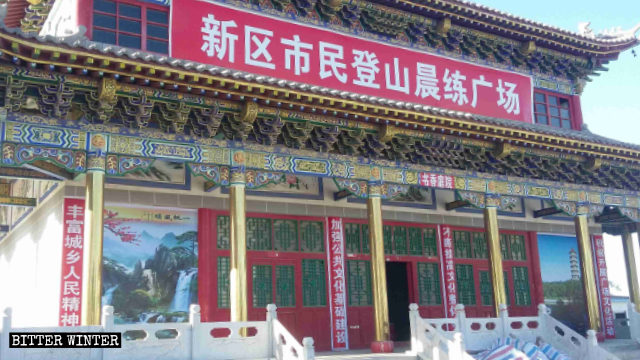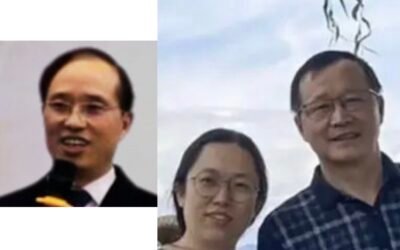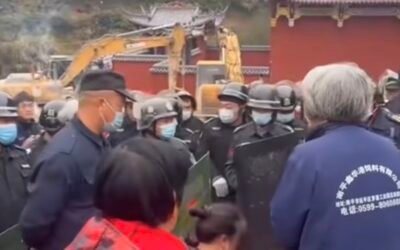Taoism, one of the Three Teachings of Chinese spirituality and religion, faces increasing suppression, as temples are repurposed and believers indoctrinated.
by Wang Yichi
On the morning of October 1 last year, over 50 daoshis, Taoist priests, wearing traditional robes, marched the streets of Ruzhou, a county-level city in the central province of Henan, waving Chinese flags and singing revolutionary songs to celebrate the 70th anniversary of the founding of the People’s Republic of China.
Video: Taoist priests are waving national flags and singing red songs in a parade in Ruzhou.
“It’s ridiculous when Taoist priests take to the streets to wave national flags and sing red songs instead of worshiping or meditating. The government is going insane,” another resident intervened.
According to a local government insider, on September 30, the Ruzhou Religious Affairs Bureau told the directors of two Taoist temples to collect national flags from the Bureau for the parade. They were ordered to form a group of daoshis to march the streets on October 1 and take photos, which had to be sent to the Bureau for inspection. All Taoist priests in the locality were also told to go to the municipal Taoist Association to watch on TV the military parade in Beijing. Those refusing to participate were threatened to be fined 200 RMB (about $ 30), and their temples could be deemed illegal.
“The government forced us to take part in the parade,” one of the priests lamented. ”The Party leaders are also the country leaders, so we have no choice but to obey them.”
On December 26, Taoists in Huaihua, a prefecture-level city in the central province of Hunan, planned to hold a celebration for two essential figures in Chinese Taoism: Jade Emperor, the ruler of Heaven, Earth, and Underworld, and Daode Tianzun, the Taoist Supreme God, commonly known as Taishang Laojun—the Highest Elder Lord. Since the day coincided with the 126th anniversary of Mao Zedong, the event had quite a few patriotic features added to it. On orders from the local authorities, a CCP propaganda slogan was put up at the entrance to the Sanqing Hall of the Jade Palace, and a table for offerings and an incense burner was placed in front of a Chairman Mao photo.
At the start of the service, attended by local government officials, the director of the city’s Taoist Association lead the congregation in singing the national anthem, as the national flag was raised, and kowtowing to Mao Zedong three times.
Video: The start of the Jade Emperor celebration was dedicated to commemorating Mao Zedong’s birthday.
“Each training class lasts five or seven days, and participants are not allowed to leave,” the priest lamented. “As a Taoist, I meditate and worship in peace, but the government forces us to spend time studying so many things unrelated to our faith. If you want to run a Taoist temple, you must obtain approval from the state; otherwise your temple will be suppressed as a xie jiao.”
Numerous Taoist temples have been repurposed for government use, leaving believers with no place to practice their faith. Last July, the Taiqingshan Temple in the New District of Yan’an city in the northwestern province of Shaanxi was taken over by the authorities and is now used as an activity center. The signboard of the former Erlang Hall now reads “Harmonious society,” while the one above the Laoye Hall says, “Book Yard.”

The sign of the Erlang Hall has been replaced with “Harmonious society.”
The next month, all religious statues were removed from the temple. A similar fate befell other temples in Yan’an—Longwang Temple and Laoye Temple in the county-level city of Zichang.

The square in front of the Taiqingshan Temple is now used for morning exercises, while the Laoye Hall is called “Book Yard.”
In August last year, many Taoist symbols were removed from the Qilong Temple in Xinchang, a county administered by Shaoxing city in the eastern province of Zhejiang. Instead, surveillance cameras were installed, and the national flag was raised. The place hardly looks like a temple now.

Statues from the Taiqingshan Temple were smashed.
“In the past, worshippers liked to stay in the temple for a few days,” a local Taoist priest told Bitter Winter. “To do this now, they have to register their personal information with the local Public Security Bureau first. If they don’t, they could be arrested as ‘illegal persons.’ In some cases, they may even go to jail. The government monitors everything through the cameras.” He added that the temple is no longer a place of pure Taoism. “It is filled with books on health, tea ceremony, gardening, musical instruments, chess, calligraphy, and painting,” he continued. “The temple looks more like an enterprise. Officials from the local Religious Affairs Bureau come for inspections at any time. The temple could be fined and closed if scripture not approved by the state is found here.”

Uses a pseudonym for security reasons.



